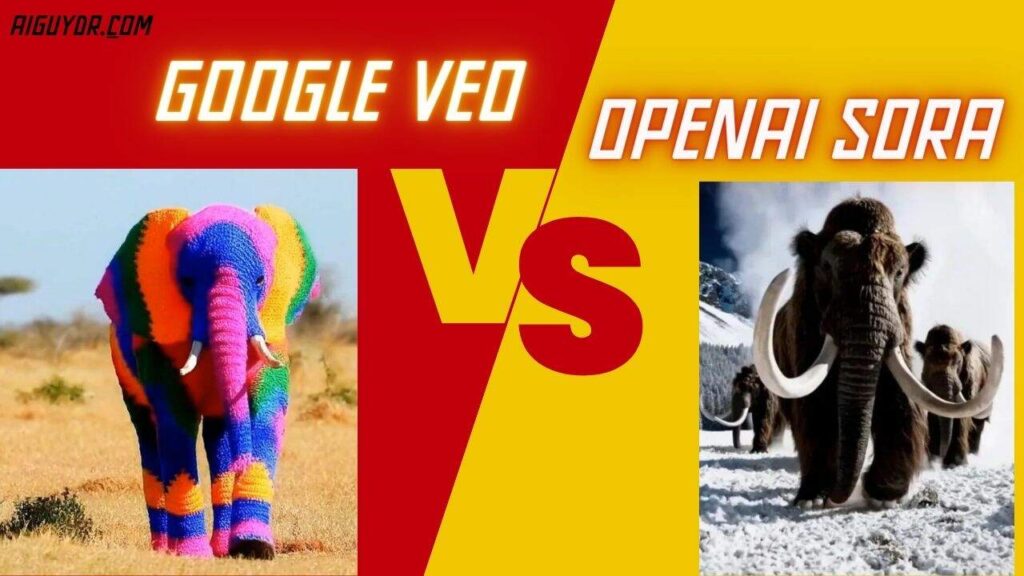
Discover the future of AI video generation with Google Veo vs OpenAI SORA. Dive into a comparative analysis of these groundbreaking models and explore their transformative impact on video content creation.
What is Google Veo
What is OpenAI SORA
Sora is an AI model developed by OpenAI that can create realistic and imaginative scenes from text instructions. It generates videos up to a minute long while maintaining visual quality and adherence to the user’s prompt. Sora is a diffusion model, which starts with a video that looks like static noise and gradually transforms it by removing the noise over many steps.
Google Veo vs OpenAI SORA Features
Certainly! Let’s compare Google Veo and OpenAI Sora in a head-to-head chart based on key features relevant to video creation needs:
| Feature | Veo | Sora |
|---|---|---|
| Video Length | Longer videos (potentially exceeding 1 minute) | Primarily short clips (under 1 minute) |
| Video Quality | High-resolution (1080p) | High-resolution (comparable quality) |
| User Control | Emphasis on user control, allowing integration of cinematic terms (“timelapse,” “aerial shot”) into prompts | Simpler interface, less granular control over video style |
| Consistency | Prioritizes maintaining consistency throughout video, minimizing frame-to-frame inconsistencies | May exhibit occasional inconsistencies between frames |
| Accessibility | Currently in private preview stage | Publicly available |
Google Veo and OpenAI SORA Comparison with Results
OpenAI SORA Results
Google Veo vs OpenAI SORA Video Quality
Google Veo Video Quality
- Resolution: Veo generates high-quality videos with a resolution of 1080p. This ensures crisp and clear visuals, suitable for professional use.
- Cinematic Styles: Veo covers a wide range of cinematic and visual styles, allowing creators to infuse their videos with specific effects like time lapses or aerial shots of a landscape.
- Consistency: Veo employs cutting-edge latent diffusion transformers to reduce the appearance of inconsistencies between frames, keeping characters, objects, and styles in place, as they would in real life.
Related post-OpenAI Sora vs Runway
OpenAI Sora Video Quality
- Resolution: Sora videos typically boast a resolution of 1920×1080 pixels, delivering detailed imagery suitable for Full HD viewing. The 16:9 aspect ratio caters to widescreen displays, optimizing visual presentation across various platforms.
- Realism: Sora aims for realism, creating highly detailed scenes, complex camera movements, and characters bursting with life. It leverages state-of-the-art machine learning techniques to generate visually appealing and immersive video content.
- Adaptability: Sora can generate videos in various sizes and resolutions, adapting to styles like photorealistic, cartoon, or abstract.
Conclusion
If you need long videos with consistent details and minimal editing, choose Veo. It prioritizes smoothness throughout. If you need short, eye-catching clips, Sora’s your friend. It excels at creating stunning visuals quickly, but you might need some extra editing for perfect results.
People Ask Questions
Which model is better for beginners?
Google Veo: Its user-friendly interface makes it a great choice for newcomers.
Can I create cinematic masterpieces with Sora?
Absolutely! Sora’s realism and storytelling capabilities allow for compelling narratives.
Is Veo suitable for professional filmmakers?
Yes! Veo’s cinematic features cater to both amateurs and industry professionals.
How do I choose between them?
Consider your priorities: realism (Sora) or creative freedom (Veo).